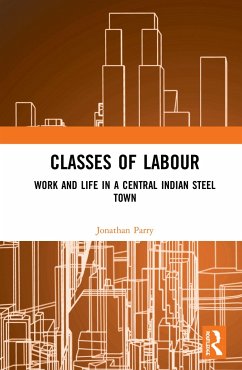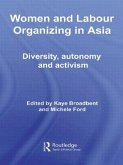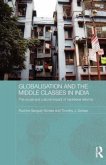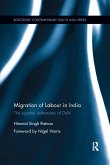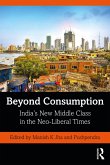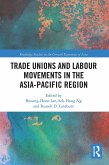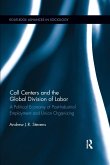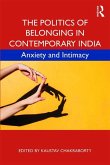- Broschiertes Buch
- Merkliste
- Auf die Merkliste
- Bewerten Bewerten
- Teilen
- Produkt teilen
- Produkterinnerung
- Produkterinnerung
The book deals with social transformations brought about by industrialization in and around the steel town of Bhilai in the Indian state of Chhattisgarh. Please noe: T&F does not sell the print edition of this title is South Asia.
Andere Kunden interessierten sich auch für
![Women and Labour Organizing in Asia Women and Labour Organizing in Asia]() Women and Labour Organizing in Asia57,99 €
Women and Labour Organizing in Asia57,99 €![Globalisation and the Middle Classes in India Globalisation and the Middle Classes in India]() Ruchira Ganguly-ScraseGlobalisation and the Middle Classes in India67,99 €
Ruchira Ganguly-ScraseGlobalisation and the Middle Classes in India67,99 €![Migration of Labour in India Migration of Labour in India]() Himmat RatnooMigration of Labour in India57,99 €
Himmat RatnooMigration of Labour in India57,99 €![Beyond Consumption Beyond Consumption]() Beyond Consumption53,99 €
Beyond Consumption53,99 €![Trade Unions and Labour Movements in the Asia-Pacific Region Trade Unions and Labour Movements in the Asia-Pacific Region]() Trade Unions and Labour Movements in the Asia-Pacific Region59,99 €
Trade Unions and Labour Movements in the Asia-Pacific Region59,99 €![Call Centers and the Global Division of Labor Call Centers and the Global Division of Labor]() Andrew J R StevensCall Centers and the Global Division of Labor57,99 €
Andrew J R StevensCall Centers and the Global Division of Labor57,99 €![The Politics of Belonging in Contemporary India The Politics of Belonging in Contemporary India]() The Politics of Belonging in Contemporary India57,99 €
The Politics of Belonging in Contemporary India57,99 €-
-
-
The book deals with social transformations brought about by industrialization in and around the steel town of Bhilai in the Indian state of Chhattisgarh. Please noe: T&F does not sell the print edition of this title is South Asia.
Produktdetails
- Produktdetails
- Verlag: Taylor & Francis
- Seitenzahl: 702
- Erscheinungstermin: 22. April 2020
- Englisch
- Abmessung: 236mm x 152mm x 41mm
- Gewicht: 930g
- ISBN-13: 9780367510329
- ISBN-10: 0367510324
- Artikelnr.: 59450081
- Verlag: Taylor & Francis
- Seitenzahl: 702
- Erscheinungstermin: 22. April 2020
- Englisch
- Abmessung: 236mm x 152mm x 41mm
- Gewicht: 930g
- ISBN-13: 9780367510329
- ISBN-10: 0367510324
- Artikelnr.: 59450081
Jonathan Parry is Professor Emeritus at the Department of Anthropology in the London School of Economics. He has conducted field research in various parts of India on various different topics. His first study was in a rural area in the sub-Himalayan region where he focused on the classic anthropological themes of caste, kinship, and marriage. He subsequently worked in the city of Banaras where he studied the various communities of `sacred specialists¿ in one way or another concerned with the `business¿ of death-specialists who preside over rituals concerned with the disposal of the corpse, the fate of the soul, and the purification of the mourners. More recently, Professor Parry has been doing fieldwork on industrial workers in the central Indian steel town of Bhilai (in the Chhattisgarh region of Madhya Pradesh) which was built on a `green field¿ site with Soviet collaboration and technology in the late 1950s and early 1960s. The public sector Bhilai Steel Plant is now one of the largest steel plants in Asia, and has served as a magnet for a great deal of private sector industrial development. Part of the fieldwork has focused on shopfloor organisation, but much of it has been conducted in the ex-villages-cum-labour colonies in which the workers have their homes. Professor Parry has also written more widely on the theoretical topics of death, the body, and exchange. Ajay T.G. is a freelance documentary filmmaker and worked as Professor Parry¿s research assistant throughout most of the fieldwork on which this monograph reports.
PART 1: Context - 1. Introduction: A Symbol and a Portent 2. Classes of
Labour 3. Building Bhilai 4. The Price of Modernity PART 2: Work - 5. A
Post in the Plant 6. The Work Situation of BSP Labour 7. Private Sector
Industry 8. Informal Sector Labour and the Construction of Class PART 3:
Life - 9. Caste and Class in the Neighbourhood 10. Growing Up; Growing
Apart 11. Marriage and Remarriage 12. Self-inflicted Death PART 4:
Concluding - 13. Focusing and Expanding the Lens
Labour 3. Building Bhilai 4. The Price of Modernity PART 2: Work - 5. A
Post in the Plant 6. The Work Situation of BSP Labour 7. Private Sector
Industry 8. Informal Sector Labour and the Construction of Class PART 3:
Life - 9. Caste and Class in the Neighbourhood 10. Growing Up; Growing
Apart 11. Marriage and Remarriage 12. Self-inflicted Death PART 4:
Concluding - 13. Focusing and Expanding the Lens
PART 1: Context - 1. Introduction: A Symbol and a Portent 2. Classes of
Labour 3. Building Bhilai 4. The Price of Modernity PART 2: Work - 5. A
Post in the Plant 6. The Work Situation of BSP Labour 7. Private Sector
Industry 8. Informal Sector Labour and the Construction of Class PART 3:
Life - 9. Caste and Class in the Neighbourhood 10. Growing Up; Growing
Apart 11. Marriage and Remarriage 12. Self-inflicted Death PART 4:
Concluding - 13. Focusing and Expanding the Lens
Labour 3. Building Bhilai 4. The Price of Modernity PART 2: Work - 5. A
Post in the Plant 6. The Work Situation of BSP Labour 7. Private Sector
Industry 8. Informal Sector Labour and the Construction of Class PART 3:
Life - 9. Caste and Class in the Neighbourhood 10. Growing Up; Growing
Apart 11. Marriage and Remarriage 12. Self-inflicted Death PART 4:
Concluding - 13. Focusing and Expanding the Lens

